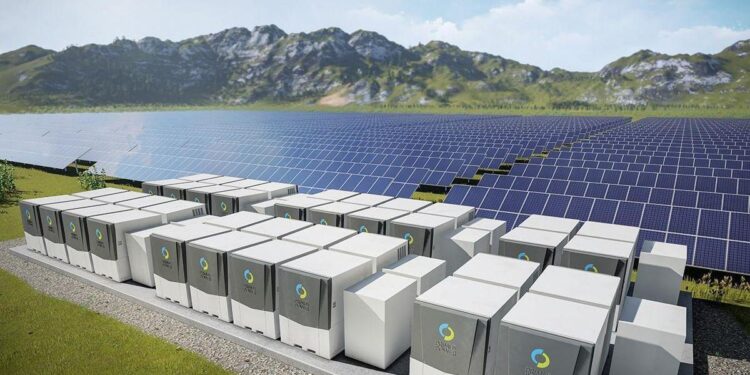DRI has expanded its foothold in the European renewable energy sector with the acquisition of a 112 MW battery storage project in Poland from Greenvolt. This strategic move underscores the growing importance of large-scale energy storage solutions in the region’s transition toward a more resilient and sustainable power grid. The deal marks a significant development in Poland’s burgeoning clean energy market, highlighting increasing investor confidence in advanced battery technologies as key enablers of renewable integration.
DRI Expands Battery Storage Portfolio with Strategic Acquisition in Poland
Dominion Renewable Innovations (DRI) has significantly bolstered its renewable energy infrastructure by acquiring a 112 MW battery storage project in Poland from Greenvolt, marking a strategic expansion in the fast-growing Central and Eastern European market. This move aligns with DRI’s long-term commitment to integrating large-scale energy storage solutions, essential for stabilizing the grid and enhancing renewable energy reliability across the region.
The acquired project boasts state-of-the-art technology tailored to support grid flexibility and peak load management. Key features of the project include:
- Advanced lithium-ion battery systems with rapid charge/discharge capabilities
- Integration with existing renewable assets to optimize energy dispatch
- Capacity to reduce carbon footprint by enabling higher renewable penetration
- Strategic location advantages for connecting to Poland’s national grid
| Project Specification | Details |
|---|---|
| Capacity | 112 MW |
| Technology | Lithium-ion Batteries |
| Location | Poland, Near Warsaw |
| Expected Completion | Q4 2025 |
Implications for Poland’s Renewable Energy Grid and Regional Energy Transition
The acquisition of the 112 MW battery storage project by DRI marks a significant leap forward for Poland’s renewable energy infrastructure. This large-scale storage system will not only enhance grid stability but also facilitate the integration of variable renewable sources such as wind and solar into the national energy mix. By providing the ability to store excess energy during peak production and discharge it during high demand periods, the project addresses key challenges related to energy intermittency and reliability.
Key benefits and implications include:
- Improved grid flexibility and reduced dependence on fossil-fuel-based peaking plants
- Acceleration of Poland’s commitment towards EU climate targets and carbon neutrality goals
- Enhanced cross-border energy exchange capabilities within the Central and Eastern European region
- Stimulus for local green technology investments and job creation within the renewable sector
| Aspect | Impact |
|---|---|
| Grid Reliability | Significantly enhanced through energy balancing |
| Renewable Integration | Supports increased capacity of wind and solar power |
| Regional Energy Market | Promotes collaboration across Balkan and European partners |
Recommendations for Stakeholders to Leverage Emerging Battery Storage Opportunities
To fully capitalize on the burgeoning battery storage market exemplified by DRI’s recent acquisition in Poland, stakeholders should prioritize strategic partnerships that fuse technological innovation with regional market expertise. By collaborating with local governments, energy developers can navigate regulatory landscapes more efficiently while optimizing project deployment timelines. Furthermore, investors should consider diversifying portfolios by integrating battery storage projects alongside renewable energy assets, enhancing both grid reliability and financial resilience as energy markets evolve. Emphasis on scalable solutions and flexible financing models will also be key to unlocking new business opportunities in this dynamic sector.
Operational best practices must focus on maximizing asset value through advanced analytics and predictive maintenance technologies, ensuring optimal performance and longevity of battery systems. Stakeholders should actively engage in policy advocacy to support favorable frameworks that incentivize storage capacity and grid integration. The following table outlines key focus areas to maximize impact in emerging battery storage ventures:
| Focus Area | Recommended Actions | Expected Outcomes |
|---|---|---|
| Collaborations | Partner with local utilities and regulators | Streamlined approvals & regional market access |
| Investment Strategies | Diversify across storage and renewables | Enhanced financial returns and risk mitigation |
| Technology Utilization | Implement AI-driven maintenance tools | Improved asset uptime and cost efficiency |
| Policy Engagement | Advocate for supportive incentives | Stronger market signals and growth potential |
Key Takeaways
The acquisition of the 112 MW battery storage project in Poland marks a significant step for DRI as it expands its footprint in the rapidly growing energy storage sector. This strategic move not only strengthens DRI’s position in the Balkan and Central European markets but also underscores the increasing importance of large-scale battery projects in accelerating the transition to renewable energy. As Poland continues to bolster its grid with sustainable infrastructure, developments like this acquisition highlight the region’s commitment to a greener, more resilient energy future.
















